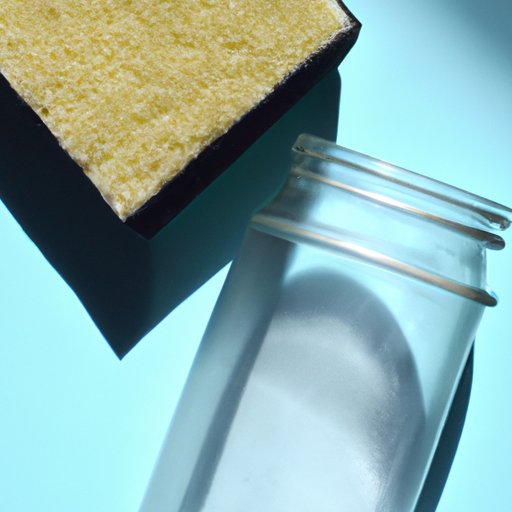
I. Introduction
Hard water stains are a common problem faced by homeowners. These stains are caused by the buildup of mineral deposits, including calcium and magnesium, which leave unsightly marks on various surfaces. While hard water stains may not be harmful, they can be unattractive and difficult to remove.
Removing hard water stains requires some minimum effort, but it’s worth it. A clean house is a happy house. In addition to improving the appearance of your home, removing hard water stains can also increase the longevity of your appliances and fixtures.
This article will provide simple and effective ways to remove hard water stains from various surfaces using natural ingredients and eco-friendly methods. From traditional home remedies to innovative techniques, this article covers it all.

II. 10 Simple and Effective Ways to Remove Hard Water Stains at Home
Here are the ten best methods to remove hard water stains from various surfaces at home:
A. Method 1: Using Vinegar and Water
Fill a spray bottle with equal parts white vinegar and water. Spray the solution directly on the affected surface, let it sit for a few minutes, and then wipe it away with a damp cloth. For more stubborn stains, repeat the process or use a pumice stone to gently remove the stain.
B. Method 2: Lemon Juice and Baking Soda
Mix lemon juice and baking soda to create a paste. Apply the paste directly to the hard water stain and let it sit for a few minutes. Scrub the area gently with a soft brush, and then rinse with water.
C. Method 3: Borax and Water
Make a paste using borax and water, apply the paste to the hard water stain, and let it sit for thirty minutes. Scrub the area gently with a soft brush, and then rinse with water.
D. Method 4: Cream of Tartar
Create a paste using cream of tartar and water. Apply the paste to the hard water stain and let it sit for ten to fifteen minutes. Then, scrub the surface gently with a soft brush, and finally rinse with water.
E. Method 5: Dish Soap and Salt
Mix dish soap and salt to form a paste, apply the paste to the hard water stain, and let it sit for thirty minutes. Scrub the area gently with a soft brush, then rinse with water.
F. Method 6: Hydrogen Peroxide
Mix equal parts hydrogen peroxide and water, and apply the solution directly to the hard water stain. Let it sit for a few minutes, then scrub the stain gently with a soft brush and rinse with water.
G. Method 7: Using a Steam Cleaner
If you have a steam cleaner, use it to remove hard water stains. Direct the steam cleaner’s nozzle at the affected surface, holding it a few inches away. Move the nozzle around the stain, focusing on one area at a time. Then, wipe away any remaining water and residue with a soft cloth.
H. Method 8: Pumice Stone
A pumice stone is a natural and effective way to remove hard water stains. Wet the stone and gently rub it over the stain in a circular motion. Be careful not to scratch the surface, then wipe away any residue with a damp cloth.
I. Method 9: Commercial Hard Water Stain Remover
If natural ingredients don’t work, you can try a commercial hard water stain remover. Be sure to wear gloves and follow the instructions on the package. Most removers require you to spray the solution directly onto the stain, let it sit for a few minutes, and wipe away the residue with a damp cloth.
J. Method 10: Prevention Tips
Preventing hard water stains is much easier and less time-consuming than removing them. The best preventative measure is to clean the affected surfaces regularly. You can also install a water-softening system to reduce the amount of mineral content in your water supply.
III. Say Goodbye to Hard Water Stains: Tried and Tested Methods to Remove Them
Now that you have ten options for removing hard water stains, which one works best?
A. Explanation of traditional hard water stain removal methods
The traditional methods for removing hard water stains are using vinegar and baking soda. These methods are non-toxic and environmentally friendly.
B. Pros and Cons of each method
The pros of using vinegar or baking soda are effectiveness, safety, and cost-effectiveness. The cons could be that vinegar may have a strong odor that will need ventilation, and baking soda may take several attempts before the stain disappears.
C. Recommendation for the most effective method
Overall, the most effective method for removing hard water stains depends on the location of the surface and your personal preference. However, lemon juice and baking soda paste have proved to be the best method for glass surfaces, such as shower doors and windows.
IV. DIY: How to Remove Hard Water Stains using Natural Ingredients
Natural ingredients are safe, affordable, and effective ways to remove hard water stains without damaging the surface. Here are some natural ingredient-based methods to remove hard water stains:
A. Explanation of natural ingredients used for hard water stain removal
The best natural ingredients to remove hard water stains are lemon juice, vinegar, baking soda, and borax. These ingredients have acidic properties that can dissolve mineral deposits and remove stains.
B. Step-by-step instructions for each method
For hard water stains on most surfaces, mix equal parts vinegar and water in a spray bottle, and then spray the affected surface. Let it sit for a few minutes, rub the area with a cloth or brush, and rinse with water. For harder stains on glass surfaces, make a paste of lemon juice and baking soda, apply it to the stain, let it sit for ten minutes, and wipe it away with a damp cloth. For another alternative, mix borax with some water to make a paste, apply it to the stain, let it sit for fifteen minutes, and wash it off with water.
C. Benefits of using natural ingredients
The best part of using natural ingredients is that you can make these solutions at home using items readily available in your kitchen. In addition, most natural ingredients are affordable, eco-friendly, and readily available in grocery stores. They are also safe to use around kids and pets.
V. The Ultimate Guide to Removing Hard Water Stains from Glass Showers
A. Explanation of why glass showers are prone to hard water stains
Hard water stains are challenging to remove, especially in showers and other glass surfaces. This is because glass surfaces, like shower doors, are porous and more prone to stain accumulation. The longer the stains are left untreated, the harder they become to remove.
B. Step-by-step instructions for removing hard water stains from glass showers
Here are the steps you need to follow to remove hard water stains from your glass shower:
Step 1: Mix baking soda and water to make a paste.
Step 2: Apply the paste to the affected surface and leave it for 20-25 minutes.
Step 3: Use a sponge or soft brush to scrub the area gently.
Step 4: Rinse the surface with water and check to see if the stain is completely removed.
Step 5: If any stains remain, make a solution of half water and half vinegar and apply it to the surface.
Step 6: Let the solution sit for an hour, then rinse it off with water. Clean the surface with a clean cloth.
C. Maintenance tips to prevent future hard water stains
To prevent future hard water stains, squeegee your glass shower doors after showering, and avoid using abrasive cleaners or cleaning tools. You can also install a water-softening system or a shower filter to reduce the mineral content of your water supply. Regular cleaning with natural solutions can help, and use a microfiber cloth to remove any remaining marks.
VI. Forget Harsh Chemicals: Eco-Friendly Ways to Remove Hard Water Stains
A. Explanation of the harmful effects of harsh chemicals
Commercial hard water stain removers are often costly, ineffective, and can be harmful to your health and the environment. Most of these products contain chemicals like bleach and ammonia, which can cause respiratory problems, skin irritation, and pollution of the environment.
B. Eco-friendly ingredients for hard water stain removal
Natural ingredients remain the safest and most eco-friendly ingredients to remove hard water stains. Lemons, white vinegar, borax, baking soda, and cream of tartar are highly effective natural alternatives to commercial stain removers.
C. Step-by-step instructions for each method
Mix baking soda and vinegar to fizz, then apply the paste to the stain until it disappears. Then, rinse the surrounding area with water. You can also use a lemon to create a paste and let it sit on the stain for about 10-15 minutes before rubbing it gently and then rinsing it afterward.
VII. From Vinegar to Baking Soda: Innovative Ways to Tackle Hard Water Stains
A. Explanation of inventive methods for hard water stain removal
WD-40 is a spray lubricant that works great for hard water stains as it removes dirt, grime, and stains. Grapefruit is another citrus fruit that can remove hard water stains as it contains citric acid that breaks down minerals and metals.
B. Details of each unique method
For using WD-40, spray the required amount of product over the area to remove hard water stains. Let it sit for a few minutes before scrubbing away the stains with a soft-bristled brush, then rinse it with water. To use grapefruits, cut them in half and put salt over the pulp side, rub the salt onto the surface, let it sit for 2-3 minutes, and rinse it with water.
C. Effectiveness of each method
Both methods are highly effective. WD-40 is popular among professional cleaners, and grapefruit is safe and eco-friendly.
VIII. Expert Tips: How to Remove Stubborn Hard Water Stains in 5 Easy Steps
A. Explanation of what constitutes stubborn hard water stains
Stubborn stains are challenging to remove as they have been left untreated for a long time, making it harder to clean with regular methods.
B. Step-by-step instructions for removing stubborn hard water stains
Here are the steps you can use to remove stubborn hard water stains:
Step 1: Combine hot water and vinegar in equal parts.
Step 2: Coat the stained surface with the mixture.
Step 3: Let it sit for 30 minutes, keeping the surface wet by adding more water-vinegar mix every 10-15 minutes.
Step 4: Scrub the surface using a steel wool scrubber until the stain disappears.
Step 5: Rinse the area with water.
C. Expert tips for maintaining a clean surface after stain removal
After you have removed the stains, maintain cleanliness by wiping the area with a microfiber cloth and regular cleaning routine maintenance to prevent the stains from coming back.





